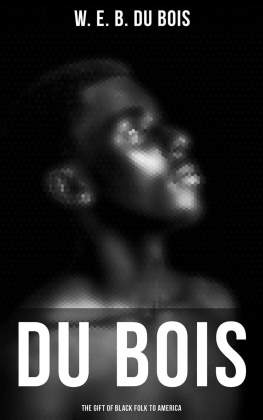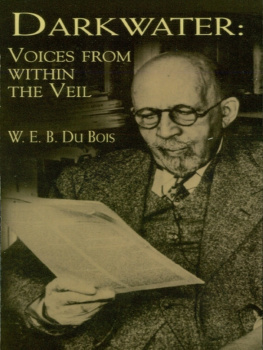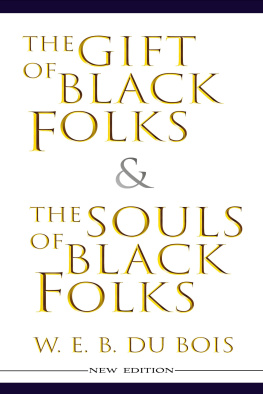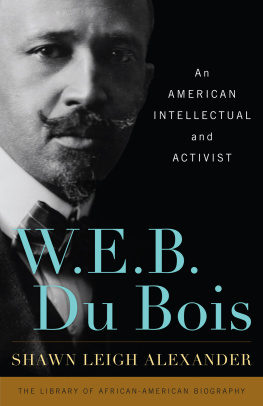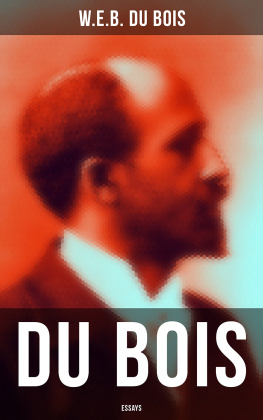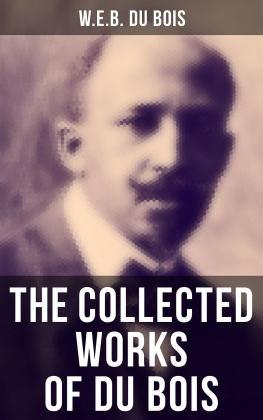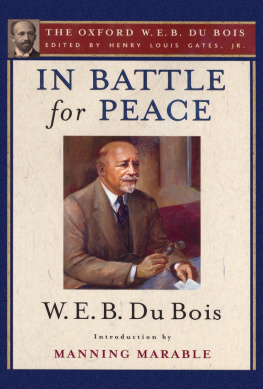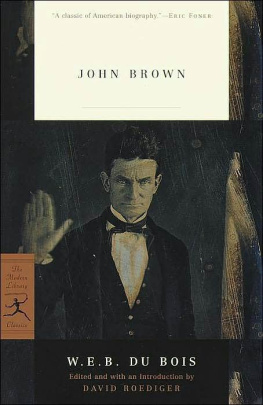Bibliographical Note
This Dover edition, first published in 2007, is an original compilation of unabridged editions of the following works: Up from Slavery , originally published in the first book edition by Doubleday, Page and Company, New York, 1901; The Souls of Black Folk , originally published by A. C. McClurg and Co., Chicago, 1903; and Narrative of the Life of Frederick Douglass, An American Slave , first published by The Anti-Slavery Office, Boston, 1845.
Copyright
Copyright 2007 by Dover Publications, Inc. All rights reserved.
Library of Congress Cataloging-in-Publication Data
Three African-American classics.
p. cm.
This Dover edition ... is an original compilation of unabridged editions
of the following works T.p. verso.
9780486131115
ISBN-10: 0-486-45757-5 (pbk.)
1. Washington, Booker T., 18561915. 2. African Americans Biography.
3. Educators United States Biography. 4. Slaves United States
Biography. 5. African Americans. 6. Douglass, Frederick, 18181895.
7. African American abolitionists Biography. 8. Abolitionists United
States Biography. 9. Slaves writings, American. I. Washington, Booker
T., 18561915. Up from slavery. II. Du Bois, W. E. B. (William Edward
Burghardt), 18681963. Souls of Black folk. III. Douglass, Frederick, 1818
1895. Narrative of the life of Frederick Douglass, an American slave.
E185.97.W4A3 2007
973.0496073 dc22
2006047013
Manufactured in the United States by Courier Corporation
45757503
www.doverpublications.com
UP FROM SLAVERY
Note
BORN A SLAVE and educated during the difficult period following the Civil War, Booker T. Washington (18561915) became one of the most influential black leaders in American history. Gaining notice through his vigorous development of Alabamas Tuskegee Institute, Washington succeeded Frederick Douglass (who died in early 1895) as the nations most prominent black spokesman with a landmark speech delivered later that year. By advocating a pragmatic doctrine of compromise, Washington gained widespread public approval (although his stance would later alienate critics such as W. E. B. Du Bois).
Up from Slavery (1901), written with journalist Max Bennett Thrasher, was the second of Washingtons autobiographies, and was carefully constructed to present a favorable portrait of its subject (the first, The Story of My Life and Work [1896], was distributed primarily by door-to-door sales in black districts). The book was tremendously successful and found an enthusiastic audience worldwide. Although scholars have observed that it gives a highly selective account of Washingtons life and opinions, Up from Slavery nonetheless continues to inspire readers with its straightforward message of personal achievement and liberation.
This volume is dedicated to my Wife
MRS. MARGARET JAMES WASHINGTON
And to my Brother
MR. JOHN H. WASHINGTON
Whose patience, fidelity, and hard work have gone far
to make the work at Tuskegee successful
Preface
THIS VOLUME IS the outgrowth of a series of articles, dealing with incidents in my life, which were published consecutively in the Outlook. While they were appearing in that magazine I was constantly surprised at the number of requests which came to me from all parts of the country, asking that the articles be permanently preserved in book form. I am most grateful to the Outlook for permission to gratify these requests.
I have tried to tell a simple, straightforward story, with no attempt at embellishment. My regret is that what I have attempted to do has been done so imperfectly. The greater part of my time and strength is required for the executive work connected with the Tuskegee Normal and Industrial Institute, and in securing the money necessary for the support of the institution. Much of what I have said has been written on board trains, or at hotels or railroad stations while I have been waiting for trains, or during the moments that I could spare from my work while at Tuskegee. Without the painstaking and generous assistance of Mr. Max Bennett Thrasher I could not have succeeded in any satisfactory degree.
Contents
Chapter
I. A Slave among Slaves
II. Boyhood Days
III. The Struggle for an Education
IV. Helping Others
V. The Reconstruction Period
VI. Black Race and Red Race
VII. Early Days at Tuskegee
VIII. Teaching School in a Stable and a Hen-House
IX. Anxious Days and Sleepless Nights
X. A Harder Task than Making Bricks without Straw
XI. Making Their Beds before They Could Lie on Them
XII. Raising Money
XIII. Two Thousand Miles for a Five-Minute Speech
XIV. The Atlanta Exposition Address
XV. The Secret of Success in Public Speaking
XVI. Europe
XVII. Last Words
CHAPTER I
A Slave among Slaves
I WAS BORN a slave on a plantation in Franklin County, Virginia. I am not quite sure of the exact place or exact date of my birth, but at any rate I suspect I must have been born somewhere and at some time. As nearly as I have been able to learn, I was born near a cross-roads post-office called Hales Ford, and the year was 1858 or 1859. I do not know the month or the day. The earliest impressions I can now recall are of the plantation and the slave quarters the latter being the part of the plantation where the slaves had their cabins.
My life had its beginning in the midst of the most miserable, desolate, and discouraging surroundings. This was so, however, not because my owners were especially cruel, for they were not, as compared with many others. I was born in a typical log cabin, about fourteen by sixteen feet square. In this cabin I lived with my mother and a brother and sister till after the Civil War, when we were all declared free.
Of my ancestry I know almost nothing. In the slave quarters, and even later, I heard whispered conversations among the coloured people of the tortures which the slaves, including, no doubt, my ancestors on my mothers side, suffered in the middle passage of the slave ship while being conveyed from Africa to America. I have been unsuccessful in securing any information that would throw any accurate light upon the history of my family beyond my mother. She, I remember, had a half-brother and a half-sister. In the days of slavery not very much attention was given to family history and family records that is, black family records. My mother, I suppose, attracted the attention of a purchaser who was afterward my owner and hers. Her addition to the slave family attracted about as much attention as the purchase of a new horse or cow. Of my father I know even less than of my mother. I do not even know his name. I have heard reports to the effect that he was a white man who lived on one of the near-by plantations. Whoever he was, I never heard of his taking the least interest in me or providing in any way for my rearing. But I do not find especial fault with him. He was simply another unfortunate victim of the institution which the Nation unhappily had engrafted upon it at that time.
The cabin was not only our living-place, but was also used as the kitchen for the plantation. My mother was the plantation cook. The cabin was without glass windows; it had only openings in the side which let in the light, and also the cold, chilly air of winter. There was a door to the cabin that is, something that was called a door but the uncertain hinges by which it was hung, and the large cracks in it, to say nothing of the fact that it was too small, made the room a very uncomfortable one. In addition to these openings there was, in the lower right-hand corner of the room, the cat-hole, a contrivance which almost every mansion or cabin in Virginia possessed during the ante-bellum period. The cat-hole was a square opening, about seven by eight inches, provided for the purpose of letting the cat pass in and out of the house at will during the night. In the case of our particular cabin I could never understand the necessity for this convenience, since there were at least a half-dozen other places in the cabin that would have accommodated the cats. There was no wooden floor in our cabin, the naked earth being used as a floor. In the centre of the earthen floor there was a large, deep opening covered with boards, which was used as a place in which to store sweet potatoes during the winter. An impression of this potato-hole is very distinctly engraved upon my memory, because I recall that during the process of putting the potatoes in or taking them out I would often come into possession of one or two, which I roasted and thoroughly enjoyed. There was no cooking-stove on our plantation, and all the cooking for the whites and slaves my mother had to do over an open fireplace, mostly in pots and skillets. While the poorly built cabin caused us to suffer with cold in the winter, the heat from the open fireplace in summer was equally trying.




